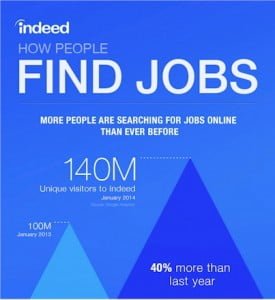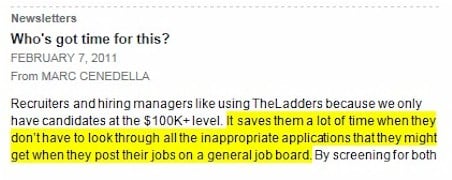In the May 20, 2014 Ask The Headhunter Newsletter, a reader with a trust fund just can’t get it in gear:
I got a Ph.D. in Comparative Literature three months ago, and I’ve been unemployed ever since. The only job that my Ph.D. would lead to directly is an academic one, but I was so tired of the academic world that I had to do something else.
I come from a wealthy family, and they’ve set up a trust fund for me, so I’ve had enough money to survive on, but just barely. I thought I’d use this time to figure out what I’m going to do with my life. And guess what? I haven’t. I thought at first that I’d like to be a freelance journalist writing commentary on current events and the arts. But it’s very difficult to break into that business.
So I’ve decided I’d like to get a normal job. My family really wants me to get a life, and they’ve got a lot of money, so they’d pay for any kind of training. And so that leads me to my question here: What kind of training is the most likely to get me a middle-class job as soon as it’s done?
Personality factors are important here. I’m intelligent and hard-working, but I don’t really have people skills. I can usually be polite with people, but not friendly. I’m not good at small talk. At a recent dinner, I was talking over a career in financial planning with my family, but they said that I don’t have the people skills for it. They’re probably right. I need anonymity. I would not be good at anything that required a great deal of schmoozing.
Probably a lot of the other typical job tracks for humanities people, like editing and publishing, would require a lot of schmoozing, too, so you’ll understand why I’m leery of them.
So, what would you recommend for a person like me?
Nick’s Reply
Your candor is a good sign, so I’m going to be extremely blunt with you. Sorry if I sound like I’m punishing you for your family’s wealth. I’m not. It’s clear that you could not live on your trust fund anyway, but I want to help you get past it, because I think your money is stopping you from moving on with your life.
You need to work. Any kind of work. If you didn’t have the little bit of money your trust fund provides, you’d be tackling any job you could get to pay the rent. The outcome of that would be a process of exploration and elimination. You’d quickly learn what you like and don’t like — at a very fundamental level — about the jobs you’ve taken.
Get a job
Flip burgers. Wash floors. Wait tables. Work on a production line. Do some typing. Answer phones. Crunch spreadsheets. Anything. I’m not suggesting that any of those might turn into a career, but rather that the experience of working would illuminate life and work in general for you. In any of the jobs I’ve listed, you’d be part of a larger company that encompasses all kinds of work and jobs. (For a good start, try Fearless Job Hunting, Book 1: Jump-Start Your Job Search.)
For example, crunching spreadsheets at a public relations company could illuminate editorial, marketing, finance and other kinds of functions. Working a production line could teach you a lot about working with your hands. Like a rock band once sang, life is a minestrone. There’s a lot in that bowl, if you take time to look, and it’s all quite filling.
Get to know everyday people
Once you start working at any job, you will also meet your biggest challenge: dealing with people. Forget about anonymity. It’s not an option, especially at your age. If you let your lack of “people skills” be the excuse for not doing certain kinds of jobs, you will die half a person. You need to get close to other people if you want to find yourself. Trust me: You are one of us, and us has nothing to do with wealth.
Know where I developed my people skills? While I was in college — a shy, introverted, relatively asocial kid — I worked summers and holidays in a factory. My co-workers had third-grade educations, fast cars, long knives, drug habits, crazy girlfriends, very spicy food in their lunch bags, mean streaks, happy-go-lucky attitudes, and very high standards about who they called their friends.
It took a while, but I finally lost my holier-and-more-educated-than-thou attitude and learned to pay attention to the people around me. By the end of my first summer, I had friends who would take a bullet for me. (I mean that literally.) I don’t think I’ve ever felt so proud to be accepted by other people. I graduated from that factory with a lot of people skills. And I learned a lot about what I didn’t want to do. I passed many hours doing menial, repetitive work fantasizing about things that interested me. That’s how I found some direction — by working very hard, getting lost, and taking time to think while I collected a paycheck.
Start your life
Your bit of money is killing you. I’m not suggesting you throw it in the river. I’m suggesting that you get a job — any job. Learn to work with people, no matter how awkward it feels. (Don’t worry. If you’re rude or inattentive, they will slap you into shape, literally or figuratively. We all need that sometimes. I know I did.)
Your experiences with others will bring your real interests and motivations to the surface. And that will drive your choices. If you come up with something you’d really like to do, don’t do it. Make yourself wait until you’ve had a chance to change your mind. If you’re still focused on that one thing, then go do it. If it doesn’t work out, don’t be afraid to move on to something else. (For help getting in the door, try Fearless Job Hunting, Book 5: Get The Right Employer’s Attention.)
The first rule: Make choices now. No sitting around trying to figure things out. No waiting for your family to bless your choices. Work.
Second rule: Be honest with yourself about what you’re doing and why. But don’t feel you must explain it to anyone, least of all your family.
This is not career counseling. It’s life. Don’t let “the world of opportunity” bog you down. Don’t be too rich to land a job. The opportunity you need is to see yourself work with other people. You’ll learn a lot about yourself — no matter what the work is. Sometimes menial work is better. Sometimes you can learn more by working with laborers who are closer to “work” than white-collar “professionals” are.
Please start your life now. Don’t let yourself develop a disdain for the world that is matched only by your fear.
By the way. I, too, was a Comp. Lit. major for a while. The result: Today, my friends are puzzled by my reading habits, but they have no idea that Turgenev, Nabokov, Dickens and Flaubert have influenced my writing style as much as Lenny Bruce. :-)
Never let any of this boggle your mind or make you despair. A fine mind can have a good time with any kind of work if it stops worrying. No more education — at least not yet. The best training for you is on-the-job-training. Go work anywhere to start. But go work.
(Beware of career counseling. For many, its sedative properties can be lethal. To get on your own path, try the short version of Pursue Companies, Not Jobs. The full version is in one of my PDF books.)
Did you discover yourself (and other people) through an unlikely job? What kinds of work have you done that shaped your work ethic? Which job taught you how to be a successful human?
: :



 The Q&A section of the presentation was great — but of course, there were so many questions that we couldn’t get to them all.
The Q&A section of the presentation was great — but of course, there were so many questions that we couldn’t get to them all.










